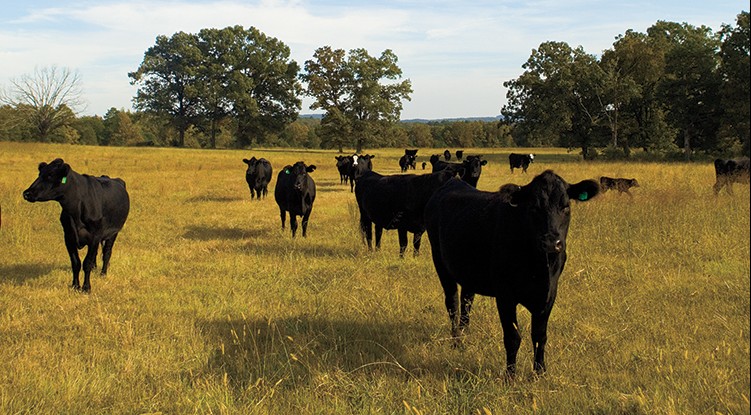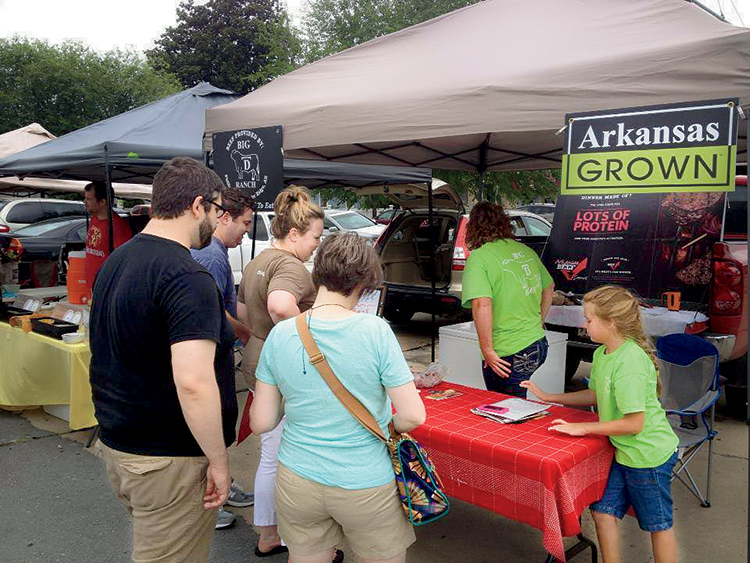Home > Arkansas > Arkansas Crops & Livestock > Redefining B2C (Beef-to-Consumer)
Redefining B2C (Beef-to-Consumer)

In the 14 years she’s been married, Beth DeSalvo says she has never bought beef from a grocery store. That’s because DeSalvo and her husband, Phillip, owners of Big D Ranch in Center Ridge, are fifth-generation cattle ranchers and feed their family the beef from their own herd. Now, DeSalvo is extending that option to her neighbors by selling Big D beef directly to consumers at farmers markets.

Farm-To-Fork Marketing
DeSalvo sells Big D beef at the Argenta Farmers Market in North Little Rock and the Conway Farmers Market at Antioch Baptist Church. She says she has been surprised by the variety of customers her stand attracts.
“There’s such a diversity of people at the farmers market, but they all have the same objective – supporting their local farmers and ranchers. They want to have a better relationship with the people who are providing their food,” she says.
Beefing Up Education
Answering customers’ safety concerns is part of DeSalvo’s education efforts.
“I get a lot of information from the Arkansas Beef Council – some great reference books and pamphlets, and recipes and general information about beef – that I’m able to hand out at the farmers market. I think it’s very important for us as producers to be in front of consumers getting the right information out there for people. We can make them feel comfortable, and let them know their beef is a safe and wholesome part of their diet,” she says.
Ed Mabry, owner of Cherokee Farms in Batesville, agrees. Mabry sells his specialty beef at farmers markets and online at cherokeefarms.net.
“I sell beef to families who want as good a cut of beef as possible. They want to know where their beef comes from. Customers want to know about the cow’s diet. They want to know that [the beef] is hormone free, and that the cows were raised in a low-stress environment,” Mabry says.
![Arkansas Beef [INFOGRAPHIC]](https://eadn-wc01-4177395.nxedge.io/wp-content/uploads/2020/05/Screen-Shot-2015-03-03-at-3.26.33-PM.png)
Welcoming Wagyu
Mabry, who has been farming since 1997, raises three herds on his ranch – a commercial Angus herd, a purebred Angus herd and a Japanese Wagyu herd, known for producing the increasingly popular Kobe beef.
“It’s a very high-marbling meat. I’m using the Wagyu to crossbreed with the Angus to raise the marbling qualities and increase the overall quality of the beef,” he says.
“I’ve learned from my years in the industry that to have a consistent product, you have to have a consistent process,” Mabry says. This is why he trusts Meacham Packing in Batesville to process his beef.
“They dry age our meat for 32 days to increase the tenderness of the beef before they separate them into individual cuts. Then the meat is flash frozen and shrink-wrapped to stop the aging process. There’s no air to it so there’s no freezer burn.”
At the end of the day, Phillip DeSalvo says it comes down to the consumer. “We want to be able to provide them with a safe, nutritious, local choice for their beef.”




![Arkansas Beef [INFOGRAPHIC]](https://eadn-wc01-4177395.nxedge.io/wp-content/uploads/2020/05/Screen-Shot-2015-03-03-at-3.26.24-PM.png)